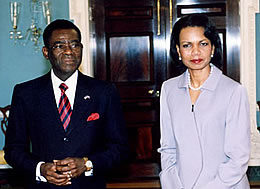 If you think the U.S. tobacco industry is bad, you'll find the behavior of many of the same companies overseas to be truly shocking.
If you think the U.S. tobacco industry is bad, you'll find the behavior of many of the same companies overseas to be truly shocking.
Happily, the industry is beginning to be held accountable for its operations in the Global South. Nigeria's two largest states are following the lead of U.S. states, in suing British American Tobacco (BAT) of Nigeria, its U.K. parent company and Philip Morris International for the health care costs of treating sick smokers, The Times of London reported this week.
The new lawsuits demonstrate the importance of the online public databases of previously secret tobacco industry documents. The 1998 U.S. Master Settlement Agreement required major tobacco companies to reveal millions of pages documenting unethical -- and even illegal -- marketing, public relations and lobbying campaigns. A lesser-known treasure trove is the British American Tobacco Documents Archive, which has made some seven million pages of BAT documents freely available. These documents are of particular importance to countries like Nigeria.



 Newsday reports on a successful cooptation of the activist group
Newsday reports on a successful cooptation of the activist group  If you think the U.S.
If you think the U.S.